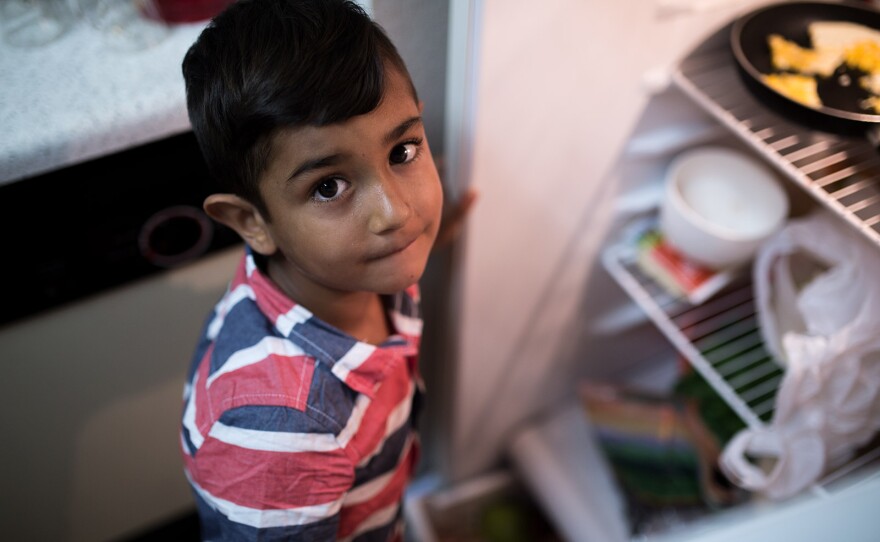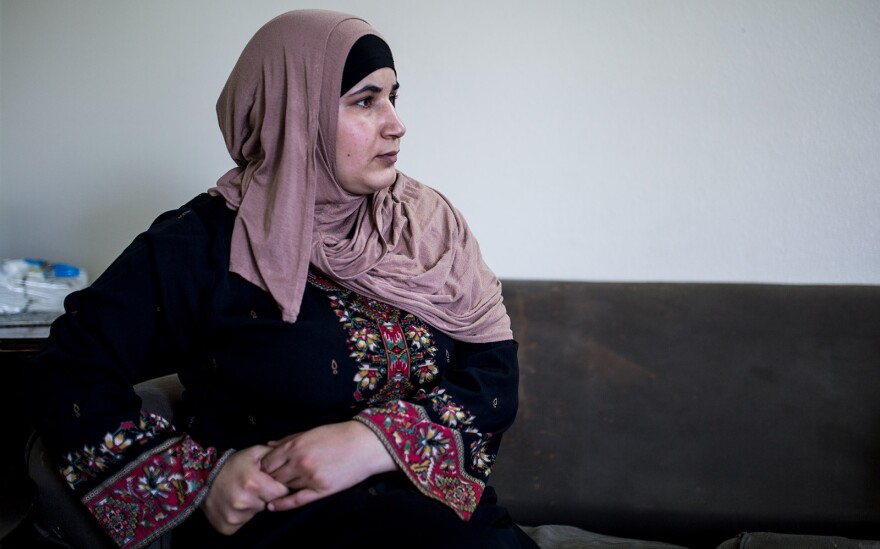The inside of Mostafa Inezan’s two-bedroom apartment in El Cajon was a standard white-walled, brown-carpeted space — except for the hardwood dining area. It was void of knicknacks or family photos, but full of Inezan’s five young sons roughhousing one sunny afternoon. The youngest, a toddler, occasionally waddled around in his unsnapped onesie and tugged at the buttons on his mother’s dress.
The quarters provided the family a stable home after escaping war in Syria. Inezan said they fled after the third time government forces detained and tortured him — the first left Inezan blind. His then-5-year-old son saw some of the abuse. The child looked down and shook his head when asked if he remembers, but his father said he tenses up when he sees people in uniform.
San Diego’s International Rescue Committee — one of four resettlement agencies in the region — found the family’s apartment last year. The organization, an affiliate of the international nonprofit that provides safe harbor for conflict- and disaster-displaced immigrants, uses federal funds to arrange housing and basic needs for refugees during their first three months.
However, about six months after the Inezan family arrived in San Diego, they were faced with leaving their apartment because seven was too many people for the space, a management company representative told KPBS. The family had few prospects for a new home.
“I don’t know anyone, first of all,” Inezan said in Arabic through a translator. “And I am blind, I don’t see. Who would give us a house?”
Inezan’s situation is partly the consequence of bad timing. He arrived in August 2016, during San Diego’s largest refugee influx since 2012. This wave forced the IRC to resettle a surge of limited-income families in one of the nation's toughest rental markets.
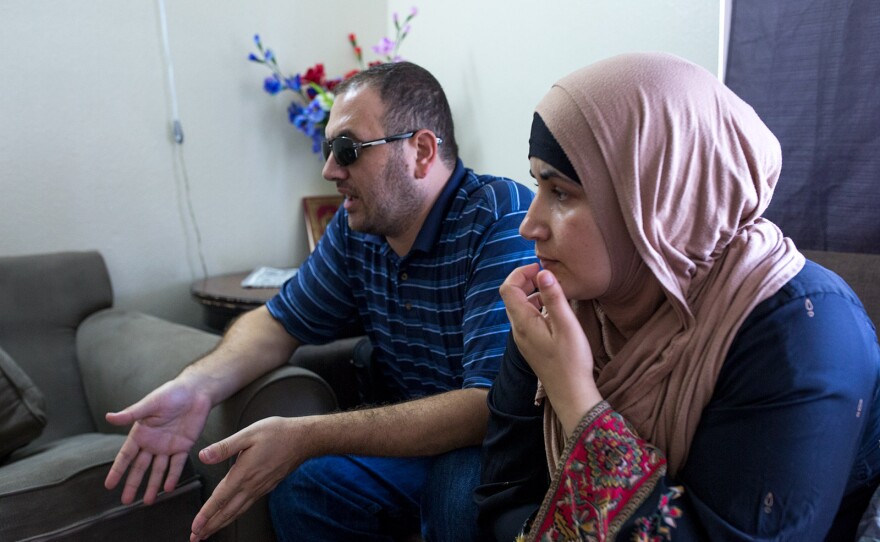
Three other Syrian families interviewed by KPBS in a five-month investigation allege IRC staff encouraged them to falsely declare their family’s size on rental forms because larger apartments were too costly. Inezan and his family were forced to vacate because his family was not accurately documented on the lease. The other families could be asked to leave their homes, too.
In an email, IRC Executive Director David Murphy said the nonprofit’s caseworkers insist “they have not told clients not to talk to a landlord about how many people are on a lease.”
He said it is the agency’s policy to list all occupants on a lease.
“If there is an oversight, then the refugees should absolutely talk to the property management company and fix the oversight,” he wrote.
The plight of the families interviewed by KPBS puts in stark relief the difficulties refugees have when beginning a new life in the expensive but welcoming region of San Diego.
‘What is the agency supposed to do?’
San Diego received more refugees last fiscal year than any other region, a U.S. State Department official confirmed. County data show about an average of 250 refugee arrivals per month in fiscal year 2016, until last August when that number roughly tripled. September saw even more.
This left the IRC “very crunched for a period of a couple months,” then-Deputy Director of Programs Erica Bouris told KPBS in an interview about the surge of refugees coming to San Diego. Some families lived in motel rooms for weeks while caseworkers searched for housing, she said.
Inezan said he and his family avoided this — they arrived at the beginning of the surge and were shuttled directly to their two-bedroom apartment in August. He said when it came time to sign his lease, he told both the IRC-provided translator and an on-site complex manager that his family was seven people. Still, only six names appeared on the lease. IRC’s Murphy said he could not pinpoint how the error occurred.
An apartment is expected to be “decent, safe and sanitary” and adhere to limits on capacity, according to a copy of the agreement between resettlement agencies and the federal government. Housing guidelines suggest two people to each bedroom and up to two more in the living area. Families should also be able to handle monthly rent on their own — “to the extent possible” — after a resettlement period that can last up to 90 days.
Agencies receive $2,075 per refugee, about half of which goes to the agency’s overhead costs, and the rest goes to cover rent and expenses, such as furniture, household items, clothing, food and — in some circumstances — a motel bill. The government expects funds to be left over so refugees can have cash after the resettlement agency’s support period ends.
University of Chicago lecturer Jessica Darrow, who has done several research papers and presentations on refugee resettlement, said the standards-to-resources ratio puts caseworkers in a tight spot when searching for housing, especially with larger families who require more space.
“There could be eight refugee families that are that big arriving, but only two or three units on the market,” Darrow said. “So what is the agency supposed to do?”
Darrow said the way refugees claim IRC caseworkers solved this dilemma — allegedly squeezing large families into smaller but affordable homes under false pretenses — is not a “tenable solution,” but she said the bigger problem is why caseworkers would need to do so in the first place.
She referred to when the per-refugee stipend for the client and the agency was $900. Eric Schwartz was assistant secretary for the U.S. Bureau of Population, Refugee and Migration at the time and traveled around the country to witness what resettlement looked like.
"It was heartbreaking to hear the stories," Schwartz told The Washington Post in August 2010.
The newspaper painted a picture of refugees being “forced to decide between buying food or diapers for their children.”
Schwartz was able to get approval to double the allotment to $1,800.
“And that was real acknowledgement that this resource story — that you and I are talking about — is there,” Darrow said. “Since then, there have been these small incremental changes to that amount of money, but that’s it. The change in resources has not kept up with the change in cost over time of stable housing and safe housing and secure housing.”
‘We just wanted to leave’
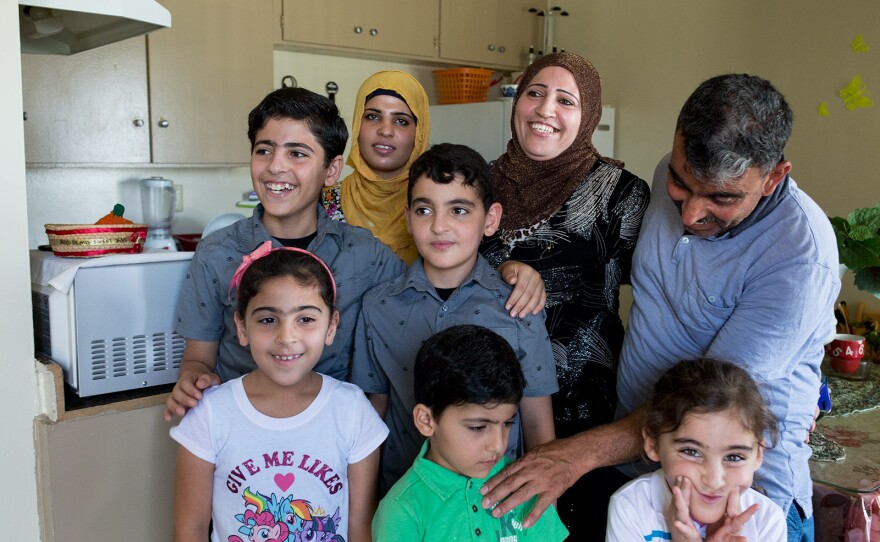
The quiet El Cajon apartment complex Mohamad Abdullah and his family call home has a patch of lush grass in front. His six kids have their own room to play with whirring trucks and stuffed animals after school. His wife has a kitchen to prepare guests a tray of beverages in gold-rimmed etched glasses.
That was not the case when he first arrived in San Diego. He said the IRC initially housed them in two double-bed motel rooms with a mini fridge and microwave. Abdullah watched for 35 days as the family’s limited funds to start a new life were spent on a place he did not want to live.
“Our stay at the hotel became long. There was no choice (for the organization), and we just wanted to leave but didn’t know where to go,” Abdullah told KPBS through a translator.
The family had been searching for a place to go since Syria’s war broke out in 2011. Abdullah said they hopscotched around Syria, encountering ISIS three times, before leaving the country entirely.
When the IRC found their current two-bedroom home, Abdullah said he thought the place near the Arabic markets and his children’s school was ideal for his family of eight. It was not. According to federal housing guidelines, his family’s size called for at least a three-bedroom.
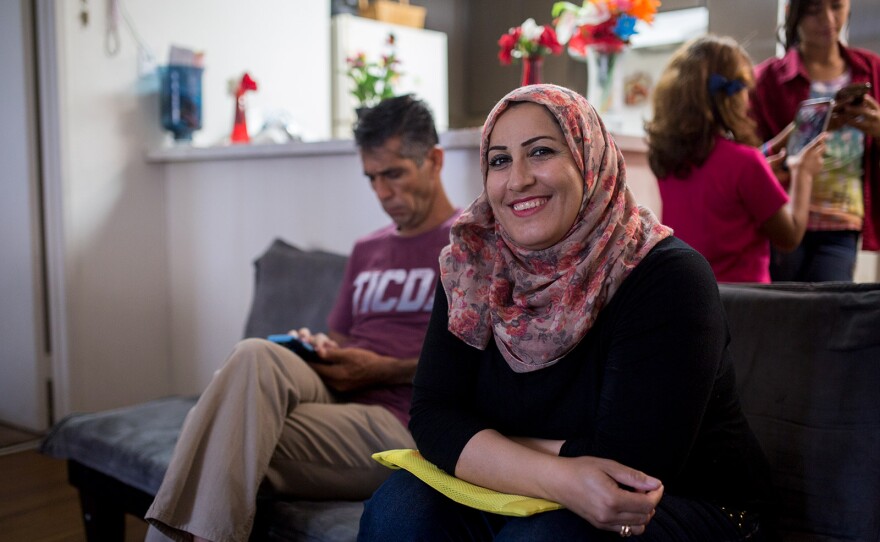
When it came time to sign his lease, Abdullah said an IRC staff member stopped him just before he entered the room with the manager.
“She told us not to show the IDs, because, ‘We didn’t register your full family,’” he claims the staff member told him. “‘We registered six people, not eight.’”
Abdullah said he pushed back.
“They let us in on a lie, so are we going to spend our whole lives living in a lie?” he told KPBS. “At any moment, any minute, they can kick us out because of this lie. This is a serious matter.”
The two-bedroom apartment would be cheaper, he said he was told, so he signed. He said he renewed the lease without adjusting the number of occupants because he did not want to alert his manager to his family’s true size. He said he still worries they will be asked to leave.
The story is similar for Daliya Ali, who said she spent three weeks in the same motel before the IRC found a home for her family of eight. Ali said she knew she should not have accepted the lease listing only six people because an overseas orientation warned against signing false documents, but she felt she had little choice.
“They told us, ‘Rent is high and there aren’t a lot of places to rent,’” Ali said in Arabic to a translator. “They told us, ‘If you don’t sign, you will stay in the hotel another month. But if you sign you can stay here. And the hotel is filthy. You can stay here in this apartment until we find you something else.’”
This echoes what Mahmoud Alibrahim claims an IRC staff member told him. He said the agency placed his family of seven in a two-bedroom home after 25 days in the motel.
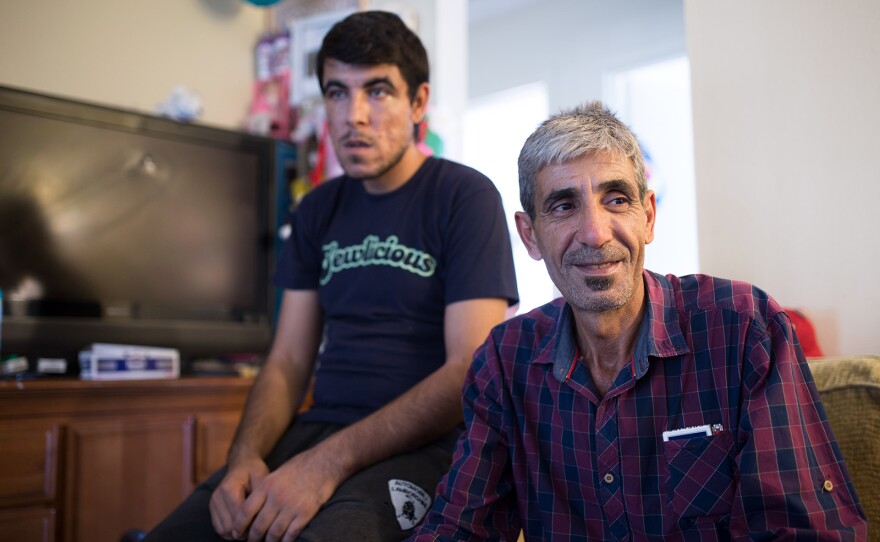
“The IRC caseworker told us, ‘We registered the apartment for six people, not for seven, but don’t say anything, just say six,’” Alibrahim said, speaking in Arabic.
Estela De Los Rios, executive director of the fair housing nonprofit CSA San Diego County, said between this past November and December — shortly after the refugee surge — the agency heard from 10 refugee clients who claimed they were being asked to leave their apartments because their families were too large for the space. De Los Rios said the clients’ complex managers claimed they were misled by the resettlement agencies about the number of occupants in the home. She said she heard of families of up to 10 people sharing a one-bedroom apartment.
The problem was new for De Los Rios. She could not determine which resettlement agencies placed the 10 clients but said she contacted Murphy, head of the IRC in San Diego, in December to understand why it could be happening.
“I have not had any clear answers,” De Los Rios told KPBS in early March.
‘There is a lot of anti-refugee media out there’
In an interview later in March, Murphy confirmed that he met with De Los Rios to discuss housing issues but claimed she did not raise the specific issue of too many occupants being resettled in an apartment.
“This is the first time I’ve heard about it,” he said. (In a follow-up call, De Los Rios maintained she specifically addressed the issue.)
During the interview, KPBS provided Murphy a copy of the Inezan family’s lease that included six names and U.S. State Department identification papers showing seven family members.
Murphy said he was not sure how the oversight could have occurred, but he would look into it. Eight days later, he responded to a follow-up email.
“Yes, I did look at this file and there is no reason that there were only six names on the lease. I have no idea why it happened,” he wrote.
KPBS spoke with the Abdullah, Ali and Alibrahim families after its initial interview with the IRC. Murphy declined via email to discuss their cases in a follow-up meeting. He wrote that he was worried he “would/could be walking into a situation that I do not want to find myself in” and was concerned because of “anti-refugee” news coverage.
Murphy said caseworkers denied they instructed refugees to conceal their family’s size. It is the agency’s policy to list all occupants on rental documents, he said, and suggested refugees address any “oversight” with their property managers.
Alibrahim said his son has since moved out, so his lease is now accurate, and he provided a copy to KPBS. The Abdullah and Ali families said they do not want to alert their property managers to their family’s true size for fear of being asked to leave. The families understood going public could expose their circumstances, but said they wanted their stories told in the hope that it would lead to a better living situation.
Ali said she found her family of eight an affordable three-bedroom apartment, but the complex would not allow more than seven to move in. The complex has not returned a KPBS request for comment.
In an email, IRC’s national office said it is looking into the allegations.
"Our mission is to best support refugees as they rebuild their lives and become part of their communities. Our relationships with community partners, including housing entities, helps lay a groundwork and foundation of trust, which our clients build on as they restart their lives,” Mireille Cronin Mather, the IRC’s regional director of U.S. programs, said in a written statement. “We are concerned about these reports and are investigating the situation to establish the facts. The IRC is deeply committed to delivering the best possible resettlement experience for our clients and take our responsibilities in doing so seriously."
A U.S. Department of State official said the agency also plans to look into the claims.
A new home
The search for a new, larger apartment for the Inezans became so difficult that volunteer Jody Crimi contemplated hosting the family in her North County home. She said she and translator Lina Abi-Samra had spent days searching online and by car throughout the county.
“I was talking to my husband about having them come and stay with us until we can find them a place to live,” Crimi said. “I was like, ‘Where are they going to end up?’”
The day KPBS spoke with Mostafa Inezan and his family, Crimi received an important phone call. A three-bedroom was available in the family’s price range and it was near the home of a friend.
Crimi and Abi-Samra ushered the family out of the home to fill out an application. They moved in the next month. All seven family members are named on the lease.]
This is KPBS Midday Edition. I am Maureen Cavanaugh. San Diego County resettled more refugees than any other region in that U.S. This high cost of living and tight rental market a take a toll on the new arrivals. Three families told KPBS a resettlement agency staff encouraged them to falsify lease documents to find housing. City Heights reporter Dixon to the problem.Syrian refugee said he spent the first month and San Diego living in two motel rooms with his wife and six kids.The state became law. There was no choice for the organization. We wanted to leave but did not know where to go. The organization is that international rescue committee in San Diego. IRC staff placed his family in a motel while they searched for a permanent place. They are local resettlement agency that uses federal funds to cover housing and needs for up to three months after refugees arrived in the U.S. Abdullah says it took 35 days to find an affordable two-bedroom. He was happy with the space but just before he went to sign the lease, he claims and IRC staff are stopped him and said not to show the government papers. The documents provided identify all eight members of his family by name, date of birth and photo. A review of the lease shows not all of them were listed on the rental documents.She told us not to show the IDs because we did not register your whole family. We registered six people, not eight. They said it was cheaper this way but it could be breaking landlord rules and goes against guidelines that the IRC has said it follows. The government recommends two people per bedroom plus two additional documents. Only six people in a two bedroom, a family of eight should be in a three bedroom. Abdullah signed the lease even though it was missing two names. Any occupants not disclosed could be considered a material violation.At any moment, any minute, they can kick us out because of the sly. This is a serious matter.A five month investigation found other refugee families living with more people in the apartment than appear on the lease. That is a potential dealbreaker. Three families claim RC staff directed them to sign that inaccurate documents in order to get them into smaller and cheaper apartments. The families arrived late last year following a surge of refugees when new arrivals rose from an average of 250 per month to three times that number by the fall. The RC affiliate declined an interview about the cases. The local executive director denied his staff purposely omitted information on rental documents. The policy is to list all occupants on the lease. The RC national office sent KPBS a statement saying a part, we are concerned about the reports and are investigating the situation. The federal government gives agencies like the IRC $1000 per refugee to cover the basic needs for the first few months. Finding affordable housing in San Diego can be tough for any low income resident but particularly for refugees who arrived with no credit and may have large families. University of Chicago flesh -- lecturer studies this. She said resettlement staff may have just been doing the best they could with what they had.If that is the only solution they thought they had to offer this family, we are not giving them enough resources to work with.Although federal funds have slightly increased over the years, she claims they have not kept up with the needs. The paper on resettlement in Chicago found caseworkers at one agency routinely sacrificed quality for affordability. Mohammed says he still is worried he could get kicked out of his apartment at any time. If that happens, he is not sure what he would do. There are members out there who are helping. Tomorrow, we will introduce you to a family that was asked to leave the apartment and tell you how the community went about finding them a new home. KPBS news.Tarin had more to share. She spoke with Andrew Bowen for the podcast series, San Diego stories, deep die. Here is part of that podcast with Andrew Askin Tarin about the director of the international rescue committee but one thing he did tell you in an email was that he was concerned about anti-refugee coverage. Everyone is familiar with the fact that that does exist. The RC does a lot of good work in the refugee community. Are you worried that this could give ammunition to people who are opposing refugees ?That was something that we brought up and I was discussing with the researcher. Jessica is at the University of Chicago. I was speaking with her about this. We cannot really let the atmosphere dictate what we report if someone says I was resettled by an agency that uses federal dollars and I did not feel like they were doing -- doing that efficiently. You look into that. When they offer you documentation, you take it to the agency then we printed what the agency said in response. I talked about this issue. What does that mean for opponents of Russian -- refugee resettlement? I mean, that is not something we can control. She did have a comment because she researched the challenges facing resettlement and she does have to highlight efficient ways that people have to do their jobs.My concern is that anything that is written that provides structure, it provides fuel for those who would restrict or constrain the program. I would like to see it improve. I would like to see a more robust program that is given more resources to do the job better. My concern is that by highlighting challenges of the program, fuel is given to those who would do a way with the program. I feel an ethical responsibility, I feel a tremendous responsibility to highlight that these are human beings who have been given a political designation. And to highlight that this is a government responsibility. Also continue to insist that we do our job better as a country and not that we continue to ask strapped organizations to do more with less with this incredible vulnerable population.If the American government is going to participate in resettling refugees. The American government should step up and make sure it is doing the job well and highlighting challenges is part of a way to make sure it is done well.I said that San Diego settles more refugees than any other region. First of all, let's let that sink in. That is astounding to me. Giving that housing cost is so high and the cost of living is so high. Why are we such a huge center when the dollars could go further in places with lower housing costs ?San Diego has a long history of accepting refugees. It got started around the fall of Saigon when people were shuttled out and brought to Camp Pendleton. You have so many Vietnamese coming here in need of placement and services because they were dropped off here. It became the natural progression of groups that were supporting that. That led to other waves of groups that were coming here, depending on what the horrible circumstances were that people came here. It has a history. It has services available. There are different groups with each wave of ethnic group. There is a new nonprofit that pops up, even with the Syrian refugees. There are grassroots efforts to support the refugees even though the dollars may not go as far but there is a lot of support you expect there is another challenge, it is other than the cost of finding housing and that is community support. We hear stories in Minnesota with Somali refugees and people not wanting them in their community but in San Diego that is not the case. Setback they have the opportunity to build a community here. When the resettlement agencies figure out where people go, doesn't already have a culture? Incident ago, they are so open to taking in refugees that there are a lot of different cultures here that when you want to make sure the refugee has the best chance to moving on and becoming a contributing member of society, you look for the other support systems. Inevitably the federal governing -- money does and and they have something here.What is next ?The IRC national said they plan on looking to this. The State Department plans to look into this. I do not know what will come from that. Hopefully they are open to responding to questions about how the inquiries are going. I do not know what they provide. I do not know what they will find or if there are lessons learned or if anything will change. We will have to keep our eye on that and watch in see, does the flow of refugees pick up? Do we have enough resources? And it is also housing stock. Do we have enough housing stock to house large families ?You heard Andrew Bowen and Taryn talking about podcast zero, San Diego stories, deep dive. You can hear more of their conversation by subscribing at www.kpbs.org .

